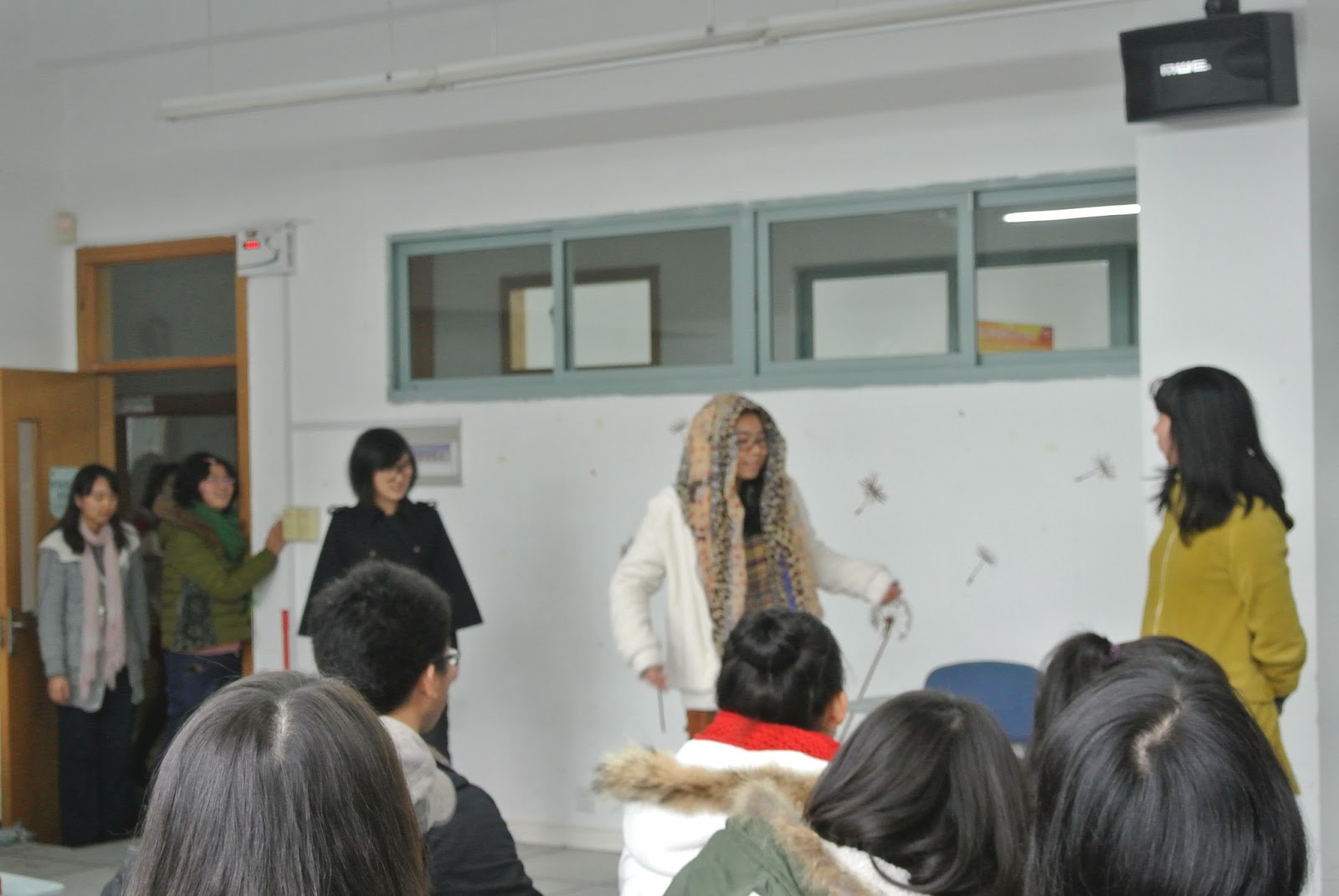Due to some teachers leaving and some scheduling issues our three-teacher Oral English class was reduced to a one-teacher operation at the end of the spring semester, and that one teacher looked like it was going to be just me in the coming fall. Thankfully, Olivia, adding to her already very full teaching schedule, agreed to co-teach this course with me, keeping us at two-teacher operation. Liv and I were pretty excited about this course because 1. We were allowed complete freedom to design our own course, and 2. While we worked at the same school, this would be the first time we were teaching together, and since we got along pretty well in every other adventure, we were excited to co-teach this course.

And I was particularly excited because not only had I made a bunch of mistakes (see earlier blog) and learned a whole lot teaching this course twice before (and Liv had also taught several sections of Oral English over the last year as well), but Liv and I had plenty of time to discuss what we wanted to do for this course over the summer, so we were, compared to previous semesters, uber prepared.
This time we had a plan! We had experience!! We had goals! We had a final assessment that the rest of the course worked to provide students with the skills to fulfill that assessment! We had a syllabus (thanks largely to Liv) that kicked all other syllabuses butts!

We learned that we would be teaching two sections of this course, just like last year. One section of Liberal Arts students (these are the English and Chinese majors) and the Math and Physics majors. Again, the same as last year. Now, by this time, we both knew that the Liberal Arts students would, as a whole, have a higher proficiency in English, and would be more motivated to improve as English is more relevant to their major. We also knew that getting the math and science majors to speak up in class would be more difficult, as they are more concerned about their lack of proficiency in English and so are shy. We could also expect a little bit less motivation as English was less critical to their majors. But this time, we were prepared.
We met on the first day of class and we we outlined our expectations to our students. We explained that we would be learning Oral English using skits. We modeled a skit using intonation, body language, and expression (and also made our students laugh as we pretended to be a girl asking her mom for money so she could go shopping with her friends later). We explained that the majority of their grade would come from participating in each weeks class. We expected them to be talking (in English, or course; we made our classrooms an English Only Zone) and fully engaged and prepared each week. The rest of their grade came from the final exam. We did not have a midterm.

In addition to their kickass syllabus was a detailed example of how to write a script, which would be turned into the teacher on the day of their performance every two weeks. We modeled writing said script (we really nailed that whole modeling thing). We set up a course email that students could contact us through and we occasionally assigned homework assignments that required them to answer us via email.
We explained to them that each person would be required to participate each week in the creation of the script and in the acting, and that each person needed to participate equally. What we meant was that you could not rely on the two most outgoing members of the five-person group to carry the majority of the skit; each person needed a part, and each part needed to have an equitable amount of stage time. Most students understood this and complied. We also (after the issues we had with acting out what they had written about in the previous semester) really hammered home the point that if they wrote, they would act it out; so make sure each person was comfortable with the script. And lo and behold, we had no issues with this this semester.

We did a two week rotation, where I would have half the class for two weeks and Liv the other half and then we would switch. This is nice because it allows us to have our own creative space in the classroom while still working together. It also allows the students to receive two different teaching styles and methods. And as a teacher, it is nice to have to only plan for two weeks to take up four weeks of classes. It also lets you realize what works and what doesn't work and what you need to change and gives you a chance to change it when you teach the next group.
We spent the semester working on four big parts of Oral English: intonation, expression, inflection/stress, and body language. I worked on body language and expression, particularly facial expression, while Liv worked on intonation and inflection/stress. You might be wondering where pronunciation fits in this, and of course we tackled pronunciation issues when we encountered them in class, but the problem with teaching pronunciation is, that other than the s/th sound and the l/r sounds, there is really little point in really stressing pronunciation for a couple of different reasons. One, there really is not a great deal of standard pronunciation in English--I mean, think of all the dialects just in America! It is more important that they get the syllable and sentence stress right, and the intonation. So we did a couple of combined lessons (the two of us in the same classroom with all of ours students) to address that s/th and r/l sound as messing those up does impact comprehension.

By the end of the semester, both groups showed marked improvement in all of our target areas (and I will provide specifics with how I taught my sections of this course in later entries). We were impressed with both groups, and even though I said earlier that the English proficiency was higher among the English and Chinese majors (as this makes sense--English is going to be necessary in their future careers) , the Math and Science students really excel in using facial expression and body language, and we were frequently pleasantly surprised with their performances.
The final exam asked students to take a fairy tales (we did some searching on the internet to find the basics of about 12 different fairy tales) and modernize them. We explained what modernize meant and gave them an example. Most of the groups understood and with a few exceptions did fine on the first draft of their scripts (we allowed them a week to write and send it to us for feedback before their performance, and we addressed any issues with most of them during this process). They they had to take their modernized fairy tales and perform a 5-7 minute skit. And we were quite pleased with the growth they had shown in each of the areas, as well as the humor and creativity with which they rewrote and performed their skits. There were very few students who, for various reasons, did not perform up to our expectations and we were very proud of the work they had done.

I feel like, while my previous sections of Oral English were certainly rewarding, and a great learning experience, it was a stressful learning experience. I felt that I took everything I had learned or not done quite as well as I wanted to the previous year and used it to make this section of Oral English as efficient and effective as humanly possible. And we had lots of fun too; Oral English can be a really fun class to teach, weather you are teaching Romeo and Juliet or Fairy Tales.
Specifics on how I taught body language and such to follow. I was going to post a video of the final exam for one of these groups, but for some reason, blogger is not cooperating.













